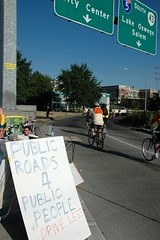
the rest of his display.]
We have a lot of highways in Portland. Maybe too many of them. They require huge public subsidies to build and maintain, they break up neighborhoods, they promote sprawl, they encourage more driving and thus more pollution, they are the site of daily fatal crashes, and their on and off ramps create deadly conditions for pedestrians and cyclists.
What’s the best way to solve the highway problem? To paraphrase the anti-nuclear proliferation activists: Just stop making them.
There’s a strong precedent for this, right here in Portland. The famous Mount Hood Highway (Wikipedia), planned to follow the route of quietly thriving Southeast Division Street, was heroically blocked by citizen activists in 1974 (the same ones who went on to found visionary neighborhood organization Southeast Uplift, which continues to advance exciting transportation-oriented programs like their new Bike Buddy program).
Maybe we could even take out some of the freeways we already have.
Why not? Look at Vancouver, BC, which never built any in the first place, with marvelous results. Last year Gordon Price, a former city councillor from our northern neighbor came to the PSU traffic and transportation class and compellingly compared Vancouver and Portland. Similar cities in many ways, but the lack of highways has led “le Vanc” to have a thriving urban center, while Portland teeters on the brink of succumbing to sprawl.

Highway removal is not be so farfetched (even in the car-centric US) and it already has a strong history in Portland.

Photo credit: Portland Parks & Rec
Take the former 99W, which ran directly along Portland’s waterfront for decades. It was removed and Waterfront Park was built in its place, home to a crowded pedestrian/bicycle path, public art projects and monuments, and almost weekly festivals that draw large crowds that get there largely by bike and public transit.
Maybe I-84 could go next, allowing alternatives to the awkward, dangerous, and few bike connections between Northeast and Southeast Portland. Even more ripe for reconsideration is I-5, which allows for very few connections, by any mode, between North and Northeast Portland, and carries on the longstanding US tradition of highways having the greatest impact on poor neighborhoods and those that are home to racial minorities.

Other west coast cities have also seen the benefits of getting rid of their biggest, most dangerous roads. After the big quake, San Francisco simply did not rebuild the Embarcadero Freeway. And Seattle currently is considering the same option with its aging Alaskan Viaduct Highway.
As Price reminded us, our highway system is aging at a rate far quicker than, and at least as catastrophically as any oil crisis. Most of our country’s highways were built within a few years, and all are now beginning to decay seriously — all at once. If we want to continue to use them, the price tag will be stratospheric — at a time when transportation funding is running out faster than we can spend it on road repairs.
Here’s a timely quote from an editorial by Toni Gold that was published in The Courant on July 23, 2006 (Gold is an associate with the Project for Public Spaces):
“The handwriting is already on the wall: Other states and communities have begun to reshape their interstates, especially through cities. Numerous freeways that separate cities from their rivers or harbors have been torn down for renewed public access and recreation; some downtown freeways have been converted to boulevards and the old street grid has been reconnected, giving an instant boost to real estate values – without, oddly enough, aggravating congestion. In all these cases the leaders of these movements are mayors, governors, citizens groups and neighborhoods – not the transportation agencies.”
Maybe we shouldn’t take out all the freeways. But maybe we should. Whatever happens, we’ll soon be forced to radically rethink the freeway system. And the sooner we start to do that, the better off we’ll be. We need to reconsider highways’ safety, social, and health impacts, and we need to recognize that we have options, even the option to do away with the things altogether.

